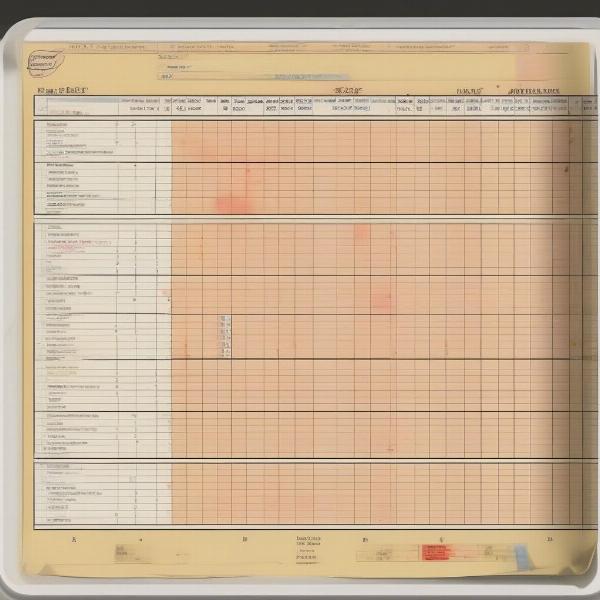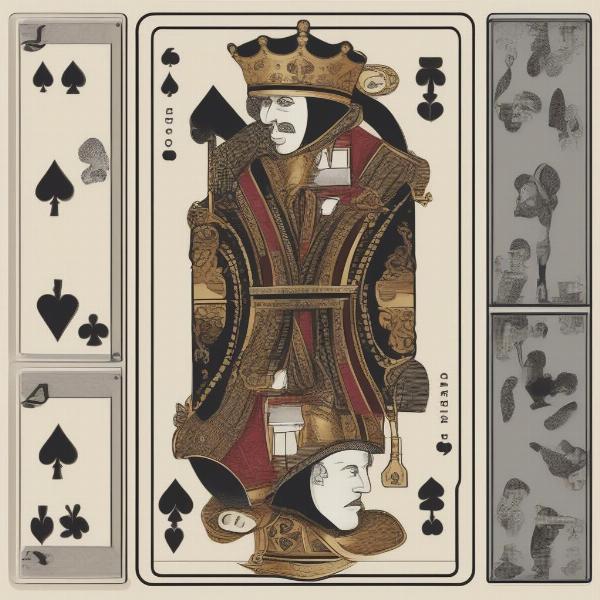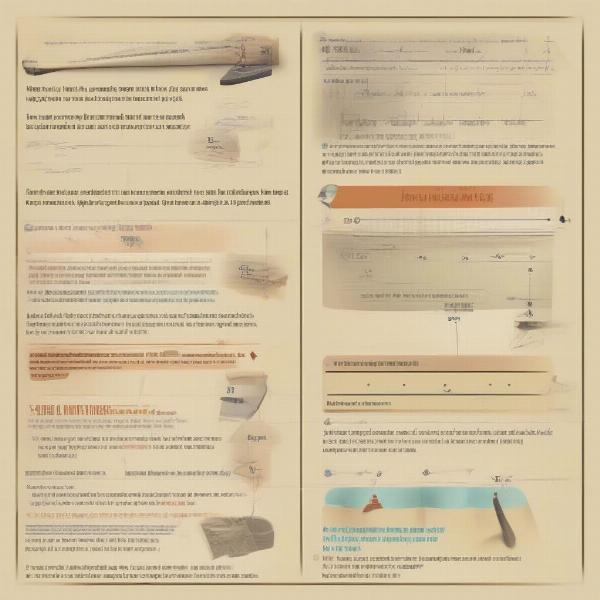Knowing how to keep score in Spades is crucial for enjoying this classic trick-taking card game. Spades, a game of strategy, teamwork, and calculated risks, relies on accurate scorekeeping to determine the winner. Whether you’re a seasoned player or new to the game, this guide will provide a clear and comprehensive understanding of Spades scoring. We’ll cover the basics, bidding strategies, and some common scoring variations to help you master the art of keeping score in Spades.
Understanding the Basics of Spades Scoring
Spades scoring revolves around bids and tricks. Before each hand, players bid on the number of tricks they think they can take. The combined bids of partners form the team’s total bid. The goal is to meet or exceed your bid without going over (known as “being set”).
Points for Tricks: The Foundation of Spades Scoring
Each trick taken earns your team 10 points. If your team takes more tricks than bid, you earn an additional point for each overtrick, called a “bag.” However, accumulating too many bags (usually 10) can lead to a penalty of 100 points, often referred to as going “sandbagging” or getting “bagged.”
Nil Bid: A High-Risk, High-Reward Strategy in Spades
A nil bid is a declaration that a player will not take any tricks during a hand. If successful, the team earns 100 points. However, if the player takes even one trick, the team loses 100 points. Bidding nil is a strategic move that can significantly impact the score, adding an element of excitement and risk to the game.
 Spades Score Sheet Example with Bids and Actual Tricks
Spades Score Sheet Example with Bids and Actual Tricks
Bidding Strategies and their Impact on Scoring
Bidding accurately is key to winning in Spades. It’s a delicate balance between ambition and realism. Underbidding can leave points on the table, while overbidding risks being set. Understanding bidding conventions and strategies can significantly improve your scoring potential.
Conservative vs. Aggressive Bidding in Spades
Conservative bidding involves bidding only on tricks you’re relatively certain of taking, minimizing the risk of being set. Aggressive bidding, on the other hand, involves bidding higher, aiming for more bags and potentially a quicker victory, but with a greater risk of penalties. The choice depends on your hand, your partner’s bidding style, and your overall game strategy.
Understanding Your Partner’s Bids in a Spades Game
Communication, even non-verbal, is essential in Spades. Paying attention to your partner’s bid can provide valuable insights into the strength of their hand. This information can help you adjust your own bid, increasing the chances of reaching your combined target.
 Chart Illustrating Spades Bidding Strategies Based on Hand Strength
Chart Illustrating Spades Bidding Strategies Based on Hand Strength
Scoring Variations and Common Rules in Spades
While the core scoring principles remain consistent, some variations exist in Spades rules. These variations can affect bidding strategies and scoring calculations.
Blind Nil: A Bold Move in Spades Scoring
In some variations, players can bid “blind nil,” meaning they declare nil before seeing their hand. A successful blind nil often doubles the reward (200 points), increasing the risk and potential payoff significantly.
Partnership Bidding and its Effect on Spades Scores
Understanding how your partner bids is critical. Some partnerships use specific bidding conventions to convey information about their hands, allowing for more accurate combined bids and improved scoring potential.
“Understanding the nuances of scoring, especially nil bids and bags, is what separates casual Spades players from true strategists,” says renowned card game expert, Dr. Eleanor Vance, author of “Trick-Taking Triumphs: Mastering the Art of Card Games.”
Common Mistakes in Spades Scoring and How to Avoid Them
Mistakes in scorekeeping can lead to disputes and frustration. Understanding common errors can help ensure a smooth and enjoyable game.
Miscalculating Bags and Their Impact on the Score
Incorrectly counting bags is a frequent mistake. Remember, bags are only counted for tricks taken over the bid, not the total tricks taken.
Forgetting Nil Penalties and Bonuses
Nil bids carry significant consequences. Failing to accurately apply the 100-point bonus or penalty can drastically alter the game’s outcome. Paying close attention to nil bids is crucial for accurate scorekeeping.
 Common Mistakes When Keeping Score in Spades Card Game
Common Mistakes When Keeping Score in Spades Card Game
“Accuracy in scorekeeping is as important as skillful play in Spades. A single miscalculation can change the entire trajectory of the game,” emphasizes seasoned Spades tournament judge, Mr. Arthur Blackwood, a veteran with over 20 years of experience in competitive card gaming.
Conclusion: Mastering Spades Scoring for Game Success
Mastering how to keep score in Spades is fundamental to enjoying and succeeding in this engaging card game. By understanding the scoring system, bidding strategies, and common variations, you can enhance your gameplay and increase your chances of victory. Remember to track bids accurately, calculate bags carefully, and pay close attention to nil bids. So gather your friends, shuffle the deck, and put your newfound scoring knowledge to the test! Now that you know How To Keep Score In Spades Card Game, it’s time to play! Share this guide with your friends and let the games begin.
Frequently Asked Questions about Spades Scoring
- What happens if both teams have the same score at the end of the game? Typically, a tie-breaker hand is played to determine the winner.
- Can you bid nil more than once in a game? Yes, you can usually bid nil as many times as you like, unless house rules dictate otherwise.
- Is there a limit to how high you can bid in Spades? The maximum bid is typically 13, representing all the tricks in a hand.
- What happens if you bid nil and your partner also bids nil? This is allowed in some variations, and if successful, often results in a higher bonus (e.g., 200 points each).
- Can you change your bid after you’ve seen your hand? No, bids are final once they are made.
- What is a “Boston nil”? This is a blind nil bid.
- How many bags are needed to get set in Spades? Typically, accumulating 10 bags results in a 100-point penalty. However, this can vary based on house rules.

